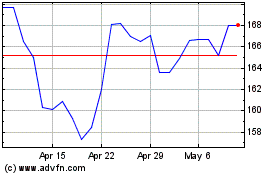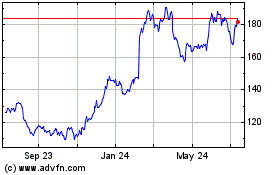By Patrick Thomas
The makers of Tommy Bahama shirts, Hollister brand clothes and
Play-Doh are moving production out of China to different corners of
the globe as more consumer goods are potentially subject to the
Trump administration's proposed 25% tariff on nearly all Chinese
imports.
Companies have become more vocal in reassuring investors and
Wall Street analysts that they are diversifying their supply chains
away from China amid growing trade tensions. Firms are moving
production to countries like India, Malaysia, South Korea, Taiwan,
Vietnam and Mexico.
Manufacturers of clothing, footwear and other low-margin
consumer items have been moving out of China in recent years due to
rising costs, but tariffs that have been implemented and threatened
have accelerated that trend.
In the first quarter of this year, imports of furniture,
vacuums, refrigerators, lamps and various other consumer goods in
China has declined anywhere from 13% to 40% from a year earlier,
according to data from global trade intelligence firm Panjiva.
"We think U.S. companies will continue to optimize their supply
chains and divert away from China," analysts at S&P Global
Ratings said in a research note. "However, this strategy is not
costless. It's limited by near-term capacity constraints and will
be more challenging for sectors that require skilled labor and
high-value manufacturing."
Oxford Industries Inc. (OXM) Chief Executive Thomas Chubb said
about 54% of its production was in China last year and that it
would be "materially less than it was last year" in 2019. "Beyond
the first half of next year, we'd expect to be operating really as
normal again to basically fully mitigating the impact of the
tariffs," Mr. Chubb said earlier this month.
Oxford, which owns brands like Tommy Bahama, Lilly Pulitzer and
Southern Tide, is moving production to countries such as Vietnam,
Thailand, India and Peru, Financial Chief Scott Grassmyer said on a
call with analysts earlier this month.
Ralph Lauren Corp. (RL), which sources about a third of its
products from China, according to its latest annual filing, said
last month that tariffs on Chinese imports enacted thus far have
had a limited impact on its business. However, the apparel and
accessories maker said that the trade spat has accelerated efforts
to diversify where it sources items to mitigate the long-term
impact of any potential tariffs.
Tailored Brands Inc. (TLRD), the Houston-based parent of
clothing retailers Men's Wearhouse and Jos. A. Bank, plans to cut
the amount of product it receives from China to between 18% and 20%
this year, Financial Chief Jack Calandra said during the company's
quarterly conference call earlier this month. The company has
already lowered the percentage of goods it receives from China to
23% from a year ago and from 30% in 2017.
"We believe we can absorb new tariffs as high as 25% within our
existing product cost structure with minimal impact to our bottom
line," Mr. Calandra said. "This outlook is thanks to the hard work
of our supply chain team, which moved quickly last year to
diversify our sourcing."
It can be costly and time consuming to uproot production from
one country and replicate supply chains elsewhere. Columbia
Sportswear Co. (COLM) said in testimony to federal trade officials
that the products it imports from China are highly specialized and
tied to significant investments made in tooling, machinery and
training personnel.
If it were to move its remaining production operations out of
China, Columbia said it would have to spend at least $3 million to
buy new machinery and train a new workforce, a process that would
take about a year. Vietnam and China accounted for about 61% of
Columbia's 2018 apparel, accessories and equipment production,
according to its latest annual securities filing.
In a letter to U.S. Trade Representative Robert Lighthizer,
Brunswick Billiards, which was recently sold by Brunswick Co. (BC)
to KPS Capital Partners, said it sources its air hockey, foosball
and table-tennis products from China and that it is difficult to
find suitable replacement suppliers. Company general manager John
Kazik said in an interview the company is in wait-and-see mode and
if it were to move the production of those products, which make up
15% of its total business, out of China it would take about six
months to a year.
"Chinese manufacturers have dominated this industry for years,
limiting the availability of alternative suppliers outside of
China," the company said in its letter. "For this segment, the
types of foosball, air hockey, and table tennis tables are almost
all exclusively built in China."
Hasbro Inc. (HAS) said it brings in about two-thirds of its
products from China, down from more than 80% in 2012. The company
has brought production of certain products, such as Magic: The
Gathering cards, board games like Monopoly and Play-Doh, back to
the U.S., Chief Executive Brian Goldner said last month. Over the
next five years, Hasbro could lower its total imports from China to
less than a third, he said.
"We've also moved our strategic sourcing footprint to places
like India and to Vietnam and other places--Mexico and other places
and as I said in the U.S.," Mr. Goldner said at a conference at
Bernstein in May.
A Hasbro spokeswoman said the company now sources 20% of the
toys and games it sells in the U.S. from U.S. suppliers, and that
it intends to increase that figure year-over-year. "Hasbro's
current goal is to achieve 64% global sourcing from China by the
end of 2019 and 60% or less by the end of 2020," she said.
Write to Patrick Thomas at patrick.thomas@wsj.com
(END) Dow Jones Newswires
June 28, 2019 14:54 ET (18:54 GMT)
Copyright (c) 2019 Dow Jones & Company, Inc.
Ralph Lauren (NYSE:RL)
Historical Stock Chart
From Mar 2024 to Apr 2024

Ralph Lauren (NYSE:RL)
Historical Stock Chart
From Apr 2023 to Apr 2024
